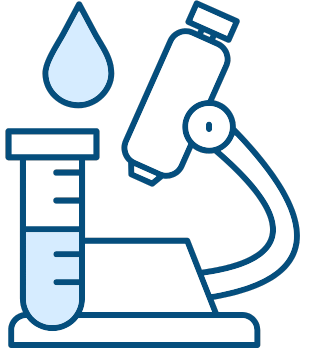Each of us has our own rhythm, pace of life and lists of priorities. However, sometimes the fast pace of life, the intense lifestyle and the stressful work can only serve as a fast track to nervous exhaustion – a subtle but serious condition whose symptoms can definitely affect our daily lives and which requires a good understanding to overcome. Therefore, in this article, with the help of Drops Clinic’s expert doctors, we will explore the symptoms, causes and treatment options of nervous exhaustion, with the aim of helping you to find the answers and to restore your inner balance, so that your soul can begin to shine in the brightest colours again.
What is nervous exhaustion?
Nervous exhaustion, also known as emotional exhaustion or burnout, is a psychological condition in which a person experiences prolonged, intense stress or emotional overload due to excessive workload, lack of rest and constant tension. Nervous exhaustion can occur in both professional and personal life.
Nervous exhaustion can affect people of all ages and occupations. It often occurs when people have high demands at work, experience unexpected changes, or accumulate stress for too long, ignoring it and thinking it is normal. However, ignoring the symptoms of nervous exhaustion can make it chronic and have a long-term impact not only on our psychological health but also on our physical health.
Symptoms may vary from person to person, but it is essential to pay attention to them in order to be able to spot the disorder in time. The main signs of nervous exhaustion include persistent fatigue, reduced energy levels, irritability, depression, anxiety, reduced productivity and concentration. There may also be a feeling of emotional detachment from work or social relationships, accompanied by a feeling of being constantly pushed to do more than one can. There is also a sense of hatred for work that was previously enjoyable. People may also experience a range of physical symptoms such as headaches, digestive problems or sleep problems.
It is important to remember that nervous exhaustion is a real condition and can be overcome. Ways to overcome the problem may include changing work routines, taking time for yourself and rest, or getting professional help if necessary. Prevention is also important: the ability to manage stress effectively and to maintain a good life balance are key factors in avoiding nervous exhaustion. Recognising symptoms early and taking the necessary steps can help ensure a healthy and happy life.
Symptoms of nervous exhaustion
Nervous exhaustion is a fairly common psychological condition that many people experience. It is thought to be caused by the modern pace of life at work. This can have serious consequences for health and quality of life.
However, if the symptoms of emotional burnout are spotted in time and treatment is provided, emotional and physical health can be restored quickly. The main symptoms of nervous exhaustion are:
Fatigue. One of the most noticeable symptoms of nervous exhaustion is persistent fatigue. The feeling that no matter how much time you spend resting or sleeping, you still don’t feel rested, and the persistent lack of energy can become a barrier to daily functioning.
Irritability. Emotional symptoms are another manifestation of nervous exhaustion. An emotionally burnt-out person quickly becomes irritable, frustrated and finds it difficult to calm down. Sounds, people or routines can also irritate. Along with irritability, a person can become extremely impatient.
Concentration problem. Another symptom of nervous exhaustion is reduced productivity and inability to concentrate. A person may lose interest in work, become disorganised, feel a ‘fog’ in the head, be unable to focus on tasks and be unable to maintain a high level of performance. Exhaustion makes it difficult to assimilate new information.
Other emotional symptoms. In addition to irritability and attention problems, other emotional symptoms such as nervous tension, anxiety, depression and even panic attacks may be experienced. The person may also feel depressed, unconfident and unable to cope with additional stress or difficulties.
Physical symptoms. Nervous exhaustion can also have physiological consequences. A person who is nervously exhausted may suffer from headaches, general weakness of the body, digestive disorders and loss of sexual desire. Muscle tension, sleep disturbances and even heart rhythm disturbances may also be experienced.
Symptoms of nervous exhaustion can have long-lasting health consequences, so it is important to recognise them in time and take action to prevent more serious complications. Knowing the symptoms and taking preventive measures can easily improve your emotional and physical health and well-being.
What causes emotional exhaustion?
Emotional exhaustion is usually caused by constant and prolonged intense stress, overexertion or chronic lack of relaxation. Of course, many factors and situations in one’s personal life or professional context can influence this state. The main causes of nervous exhaustion are:
Excessive workload: prolonged excessive workload and a regular busy schedule, with too long hours and too many responsibilities, can lead to emotional exhaustion. This is very common in professional environments, especially when people feel under constant pressure to multi-task without adequate rest.
Stress: prolonged stress, regardless of its source – be it work, personal worries or health problems – can reduce mental resilience and lead to emotional exhaustion. Persistent stress can upset the body’s hormonal balance and reduce its ability to resist stress.
Insufficient rest: Insufficient time for rest, relaxation and recovery can contribute to emotional exhaustion. Living an active and stressful life or being busy all the time often means not taking enough time for rest, which is essential for emotional recovery.
Overcommitment: having multiple commitments in professional and personal life can make people feel overloaded. When personal and professional commitments are difficult to balance, people are on the road to nervous exhaustion.
Poor self-care: not taking proper mental and physical care of oneself, inadequate nutrition, poor sleep, unbalanced physical activity and inadequate rest can lead to reduced resilience to stress and emotional exhaustion.
Environmental factors: inadequate work or personal environments with persistent conflict, excessive workload or lack of support from colleagues, supervisors and relatives can lead to emotional exhaustion.
Lack of control: feeling that you have lost control or the ability to influence your situation can cause you to feel hopelessly stuck and contribute to emotional exhaustion.
Personal expectations: Having unrealistic expectations of yourself, as well as idealising that everything has to be perfect, can lead to constant dissatisfaction and a feeling that you are not doing things well enough, contributing to nervous exhaustion.
Emotional changes: a range of intense emotional experiences, such as caring for a loved one, divorce, the loss of a job or home, the death of a family member or friend, or even the growth of a family, can cause emotional burnout.
All of these factors can interact to cause emotional exhaustion, but the key is to recognise the impact of these factors in your life and take preventive measures to avoid them or reduce their impact.
What can be the long-term consequences of emotional exhaustion?
Prolonged emotional exhaustion can have profound negative consequences for a person, not only on an emotional level, but also in a physiological, psychological and social context. Here are some of the possible consequences of long-term emotional exhaustion:
Physiological consequences: prolonged stress can have negative effects on our physical health. The physiological consequences of nervous exhaustion can include high blood pressure, cardiovascular disease, reduced immune system efficiency, digestive disorders and sleep problems. Prolonged stress can be a chronic source of disease.
Psychological consequences: Psychological consequences are very common concomitants of chronic stress and emotional exhaustion. A person may begin to experience chronic anxiety, depression, fatigue and poor mental health, with reduced resilience to stress and emotional changes. Prolonged emotional exhaustion can lead to difficulty concentrating. A person may experience persistent mood swings and a decrease in self-esteem. Such conditions can become an insurmountable obstacle in everyday life and have a negative impact on personal growth and quality of life.
Social consequences: prolonged stress can have a negative impact on personal relationships, work relationships and social life. Emotional exhaustion can lead to social isolation. The person may lose motivation to participate in social life, start to avoid attending gatherings or events, avoid making new contacts or maintaining relationships with close people.
Professional consequences: Emotional exhaustion can have a serious impact on careers. Prolonged emotional exhaustion can lead to professional fatigue or professional ‘burnout’. The worker begins to experience difficulty concentrating, constant stress and job fatigue. This can lead to reduced productivity, increased risk of mistakes and ultimately to either losing the job or leaving it voluntarily.
Health problems: prolonged stress can contribute to the worsening of a range of chronic health problems, including heart disease, diabetes and digestive disorders.
The consequences of nervous exhaustion can be long-lasting and serious, which is why it is important to recognise emotional exhaustion and take action in time to reduce its impact on emotional and physical health.
Treatment of nervous exhaustion
Nervous exhaustion can have a negative impact on physical and mental health and quality of life. In this section, let’s look at some of the treatments that can help you regain your health and life balance.
Adequate rest and relaxation: the first step in treating nervous exhaustion is to give the body enough time to relax and recover. It is important to follow a proper sleeping pattern, take time for rest, meditation and other relaxation techniques.
Stress management techniques: learning to manage stress effectively is an essential step towards mental health. There are many different stress management techniques available, so everyone can find the most appropriate way to manage stress. This can include breathing exercises, yoga, meditation, muscle relaxation techniques and other methods that help reduce stress.
Intravenous therapy: Intravenous therapy is an innovative and increasingly used method in the treatment of nervous exhaustion. In this therapy, the patient receives an intravenous infusion of specially prepared fluids, which usually include a mixture of vitamin C, B-complex vitamins, minerals and other natural substances. These substances help the body to recover more quickly and contribute to restoring emotional balance. Intravenous therapy also has the advantage of delivering the substances directly into the bloodstream, i.e. bypassing the digestive tract, so they work faster and more effectively. In addition, this therapy is completely safe.
It is also common for patients to complain of severe, persistent headaches lasting for days or weeks. When tablets or oral powders no longer help, or if the pain is intense and distressing, doctors or psychiatrists may prescribe or recommend intravenous drug treatment. In this case, treatment is not limited to vitamins or low-dose mineral therapy. The medication is administered by drip infusions for as long as and until the patient starts to feel relief. Usually this does not last more than a week.
Medication: in some cases, medication such as antidepressants or tranquillisers may be recommended to treat nervous exhaustion. Medication may be prescribed to alleviate the symptoms of emotional exhaustion and to speed up treatment. Such medication can only be prescribed by a doctor.
Psychotherapy: often professional help may be needed to treat emotional exhaustion. Cognitive Behavioural Therapy (CBT) and Stress Management Therapy are useful tools to overcome emotional exhaustion. Therapists help to identify the sources of stress, help you learn effective stress management techniques and change negative thinking patterns.
Lifestyle changes: to fully cope with emotional exhaustion and increase emotional resilience, it is important to make lasting changes to your lifestyle. It is essential to maintain a good work/rest balance, to try to maintain a less stressful daily routine and to follow a good sleeping pattern. Regular physical activity can improve mood and reduce stress.
Supportive therapy: treating nervous exhaustion can take more time, so supportive therapy is essential. This includes regular visits to a doctor or therapist and regular self-monitoring to ensure that symptoms do not worsen.
Long-term treatment of nervous breakdown can be challenging, but understanding the different treatments and how they can be combined can provide the necessary effectiveness in restoring emotional balance and well-being.
In this article, we have discussed the topic of nervous breakdown in detail, from symptoms and causes to treatment options. Nervous exhaustion is a serious psychological condition that can affect both a person’s professional and personal life. By spotting the signs of emotional burnout early and discovering its causes, people can begin to move towards healing and full recovery. Rest, stress management, psychotherapy and intravenous therapy are all effective treatments for burnout. By starting treatment and adopting lasting lifestyle changes, people can regain their life balance and restore their zest for life. And for an even more effective way to tackle nervous exhaustion and its symptoms, take advantage of the benefits of intravenous therapy. Take care of yourself and turn to Drops Clinic’s specialist doctors to help you restore your energy.




